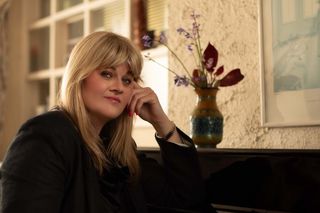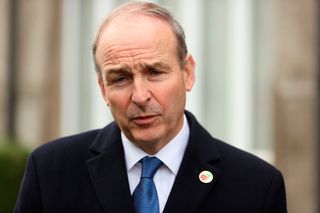Television: Kate steals limelight again in sex-trade documentary
Protest: Kate McGrew (centre) is fervently against criminalising those who purchase sex
According to the narrator of Reality Bites: Paying for Sex (RTÉ2), Kate McGrew is "Ireland's best-known sex worker". Best-known to whom, I wondered. To her clients? Then I remembered that a couple of years ago she'd featured in an RTÉ2 video-diary series, where she'd displayed her talent for self-promotion.
And she was still at it in this Reality Bites documentary about whether or not prostitutes' clients should be criminalised for purchasing sex, as in Scandinavia and Northern Ireland. That's the current Government's intention, anyway, though the intention still hasn't become law and American-born Kate is fervently against it, touring here and abroad with her message that criminalisation would only make the lives of prostitutes more dangerous.
But she so clearly loves the limelight that she seems blithely unaware of some of the contradictions in her storyline - telling us, for instance, that her lifestyle "will never be OK" to her mother and that her father just "wishes it would go away" while also insisting that they're "so proud of me".
With no concerned parents to worry about her, Rachel Moran, who had been coerced into prostitution at the age of 15, is on the other side of the argument and she presented an angrier and much less self-promoting case that men should suffer the consequences of enacting their "woman-hating fantasies on your body".
Viewers were left to make up their own minds in this film written and directed by Libby McCormack, though it was rather hard to go along with Kate's tweeted assertion that "I do have the most beautiful job in the world".
Sex work, if mainly of the relatively safe online kind, had featured in last week's absorbing second instalment of Kevin McGahern's America (RTÉ2), though in this week's concluding episode we were back with the kind of headbangers who had occupied the first programme.
If you're intent on looking for loonies, you're sure to find them, and in place of the extremist gun-toting nutters of the initial instalment, McGahern sought out various communes of non-biological "families" - anti-fascist bikers, cult-music followers on a "spiritual pilgrimage", dance obsessives and a "tits and guns" hippie farm.
Obesity and an aversion to showering seemed to be de rigueur in most of these alienated communities, and while McGahern proved to be an attentive and unfussy interviewer, the viewer wondered why three programmes about America never bothered with any aspects more nuanced than freak shows.
Jeremy Paxman was stateside, too, and in full harrumphing mode - wondering, in Paxman on Trump and Clinton (BBC1), why the election was being fought by "two of the most despised and distrusted candidates ever" and "what on earth has happened to a truly great democracy that the choice is so awful".
Curiously, and despite the programme's title, Clinton hardly got a look-in from Jeremy, who clearly had bought into the general media obsession with her ghastly rival. The presenter's mannerisms (the archly-raised eyebrows, the sardonic splutter) were much in evidence, but the viewer learned little, and Paxman's reflection that "something has gone wrong with Lincoln's dream" was nothing more than a truism.
BBC2's recent Fleabag was the year's best comedy series so far, partly because it was more sadcom than sitcom. Can't Cope Won't Cope (RTÉ2), which ended its run this week, was no Fleabag, but it became much more interesting as it went along and offered a similarly poignant portrait of a young woman in emotional and psychological freefall.
Aisling, whose feckless antics had been merely annoying (and indeed implausible) at the outset, was a screw-up lurking under the guise of a good-time girl and her downward spiral towards self-destruction became more affecting and distressing with each episode.
Much praise, then, to writer-creator Stefanie Preissner and also to Nika McGuigan's nuanced playing of Aisling's pal Danielle. But it was Kerslake's Aisling who riveted the attention. This was a fearless and star-making performance by someone the camera clearly loves.
The same can't be said for Max Irons who, in Tutankhamun (UTV Ireland), is playing an Indiana Jones-like archaeologist but hasn't either the chops or the charisma for heroic status. And nor does Sam Neill, who plays his wealthy benefactor Lord Carnavon, exactly ooze hypnotic star power.
In the opening episode of this four-parter, it was left to Catherine Steadman as feisty and (to these eyes) rather dishy American archaeologist Maggie to light up the screen in an otherwise rather stolid dramatic reimagining of the King Tut discovery.
Meanwhile the third season of The Fall (RTÉ1/BBC1) has become quite intriguing. With only two episodes to go, it has managed to eschew almost all of the usual thriller conventions (murders, chases, the whole shebang) and has still been engrossing.
And Krister Henriksson, so memorable in the Swedish TV series of Wallander, has been an excellent addition as the psychiatrist assessing serial killer Paul Spector, though how it will all end only the scriptwriter knows. Not stupidly, I trust.
I may return to the new Netflix drama Designated Survivor or I may not. In a cliche-ridden scenario, Keifer Sutherland plays a minor US government member suddenly thrust into the role of president. It's fascinating, though, to watch Sutherland becoming older without becoming in any way more interesting.
Join the Irish Independent WhatsApp channel
Stay up to date with all the latest news














